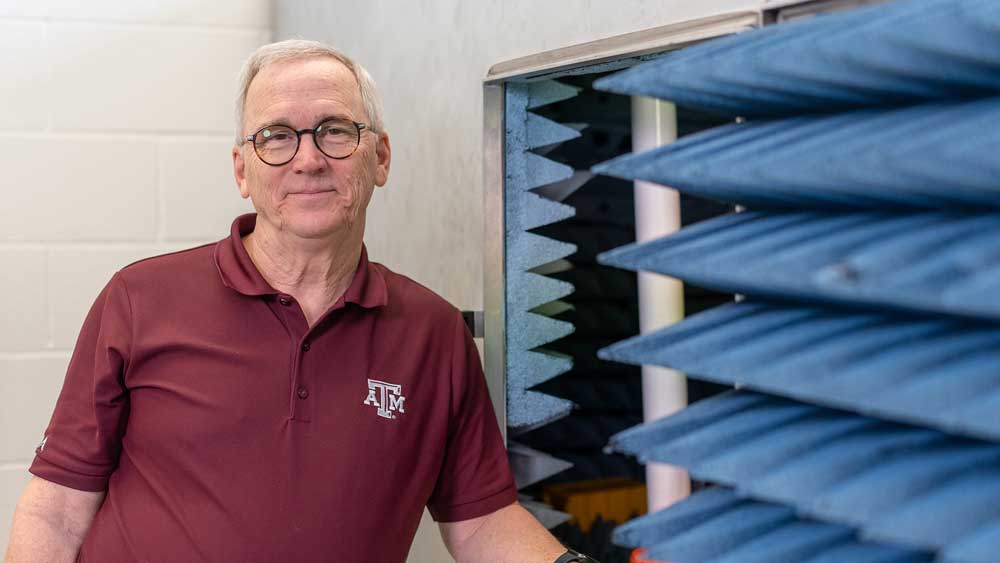
After the COVID-19 pandemic hit and Lance Decker lost his job, he felt the final push he needed to pursue a doctorate in interdisciplinary engineering at 58 years old. With two Aggies already in the family, Decker knew Texas A&M University was the right choice. Now, at 60, he is a doctoral candidate in the interdisciplinary engineering program in the Department of Multidisciplinary Engineering. With only months to go before graduation this summer, Decker feels ready to take his research to the next level.
Before pursuing a college career, Decker served in the United States Air Force for 15 years as a crew member on a Cold War command and control aircraft. He also worked several jobs in the wireless communication industry, such as establishing a wireless network through weather balloons and monitoring oil sites, using wireless technology to monitor refrigerator compressors and putting sensors inside football helmets to ensure the players were not overheating. For four years, Decker even owned a company that sold original equipment manufacturer wireless parts.
Decker’s higher education path began when he earned a Bachelor of Applied Arts and Science from The University of Texas at Tyler when he was 47 and a Master of Engineering and Technical Management degree from Texas A&M at age 57.
I am the epitome of a non-traditional student. I’m probably the oldest student in the department.
“IoT is a network of things that communicates location and/or condition to internet servers, which in turn informs system and human behavior,” Decker said. “In my case, these things are all communicating wirelessly. I work a lot with radio frequency identification (RFID), Bluetooth and ultra-wideband (UWB).”
“Everything I did in the military had to do with wireless communication,” he said. “That has followed me throughout my career. Now I’m in the IoT space, trying to track, measure and get sensor readings from things. The cash movement industry is especially challenging because it is such a hidden, closed-loop system that nobody wants to talk about. Most people don’t get to see what’s happening inside the cash movement, so it’s exciting and challenging to do something no one else has done.”
With more than 40 years of professional experience, Decker’s approach to the classroom relies on his pre-existing knowledge of the industry. All he had to do was re-learn the specifics. Through sheer grit and determination, Decker could do just that.
“Most of the time, when I’m learning something, I can apply it to something that’s happened to me in the past,” he said.
Decker also credits friends and mentors at Texas A&M with his academic achievements. Dr. Ben Zohgi, a mentor, friend and professor of engineering technology and industrial distribution, encouraged Decker to get his master’s degree and, upon completion, a Ph.D. As he was finishing his master's, Decker felt unsure about whether to keep going. Dr. Wei Lu, a mentor and now Master of Engineering Technical Management assistant director of curriculum, assured him that a Ph.D. was worth going after.
“I also spoke to Dr. Lu at that time,” Decker said. “I expressed my concerns about whether I was smart enough to do a Ph.D., and she told me, ‘You're smart enough to do this. This is something I know you can do.’ That was the moment I decided to do it.”
Alongside being a non-traditional student at Texas A&M, Decker is also a U.S. Air Force disabled veteran, a Dwight David Eisenhower Transportation Graduate Research Fellow, a Tillman Scholar and occasionally teaches grief recovery classes.
“In 2012, I lost my oldest son to a drug overdose,” he said. “After three difficult years, I found a program that helped me forgive my son and myself. I decided to teach that program to come to terms with my own loss and also help others through the grieving process.”
Decker will graduate in August 2023 and plans to work for the U.S. Department of Transportation. He recommends the multidisciplinary engineering department because it allows students to follow their interests without being locked into a strict program.
“If you’re passionate about something and you can’t find a program that fits, this department offers a way to find a path for your passion,” Decker said.